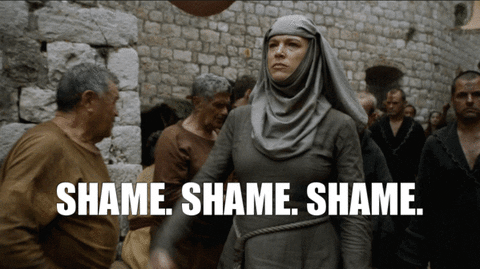Entitled to Shame?

“Unclean! Unclean!”, the leper shouts while walking through a crowd, all the while ringing the bell to announce his passing to those within ear shot. What a compassionate construct for caring for the humanity of the sick. Just kidding. But it is a historical testament about how human beings passive aggressively hold to power through the act of heaping shame on others. When I did my inspectional reading of Shame by Steele I believed it was going to be a objective exploration into the history of racism, reflecting on how liberals and conservatives participated in the polarization of people in this country. However, in the end I was deeply disappointed in Steele’s lack of holding “movement conservatives” to the same critique he applied to the “new liberals”.
I, like Steele, have taken a journey from my political roots that were shaped during my formative years. My parents were, and still are, conservative on all fronts. As I moved through life, my world view broadened, and so did my politics. These days I don’t side with liberals or conservative because neither group embodies what I call Kingdom politics. And this has become so very obvious to me in this last year and a half through the pandemic and racism crises. So when I came to this book I was very excited to read it; to hear Steele’s experience and interpretation of living life within the two sides. I was even impressed to hear him express his hope to be self-aware that he wasn’t falling prey to the same “nationalistic fervor” that the liberals around him at the Aspen Institute were espousing. But the longer I listened to Steele, the clearer it became that instead of being an objective exposition, I heard an apologetic for the put upon movement conservatives. It seemed ironic that the same shame Steele pointed to that the new liberals heap upon white people was the same shame he heaps upon new liberals for the outcome of the shame. Steele takes issue with new liberals agenda of encouraging continued embracing of victimhood among people of color, women, LGBTQ+, etc through governmental programs, while at the same time he communicates that now the movement conservatives are victims.
I serve a church that is 40 percent black and 60 percent white. In the face of what happened last year with George Floyd’s murder I realized that I had to lead hard conversations about race relations and understanding the impact of systemic racism in our city. Steele’s stories from his own life are powerful, revealing a deep vulnerability and pain. His understanding of the impact of affirmative action and education in this country are profound. His argument that the black population in this country has bought into “white guilt” message, has produced a community of entitled victims seems valid. I appreciate his wisdom. But then he says, “such was the shame of America after the 1960s that it generated a liberalism grounded in dissociation rather than in principle. This was, and remains, a needy liberalism that insists on flattening as many people as possible to the dimension of their group’s grievance against America. And so reduced, such people are prime for rescue by the new liberalism.” What seems to be missing in his argument is that generally the people who would say Clarence Thomas only was accepted at Yale because of his skin color are probably conservative. So the conservative position clearly takes the stance that does not believe in the human spirit. In chapter 12 he talks about how the new liberalism wanted to self-correct because they did not believe in the self restraint i.e. fair competition by merit, individual intuitiveness and equality of opportunity. It seems as though not only did liberals not believe in the human spirit conservatives didn’t either. In addition it highlights the truth that Friedman, writes in, A Failure of Nerve, says that often when families or organizations remain in imaginative gridlock there unable to face the hard work of dealing with their own skeletons. Conservatives and liberals alike really must do the hard work of owning their own baggage; in the words of Steele, “Take responsibility”.
After finishing Shame, I am more convinced that I must garner better skills in critical thinking and leading others to practice the same. Otherwise I will not notice when I practice the heaping of shame…even upon Shelby Steele.
Leave a Reply
You must be logged in to post a comment.